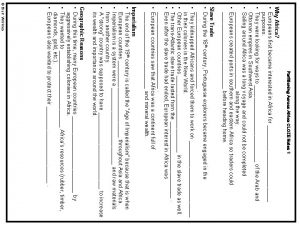Domestic work differences and commonalities across ten European






- Slides: 6

Domestic work: differences and commonalities across ten European countries Francisco Javier Gómez Abelleira Professor of Labour Law, Universidad Carlos III de Madrid, www. uc 3 m. es WEBINAR 18 JUNE 2020 15: 00 -16: 00, ETUI

personal and household services in context

employment status natural person in the household As CLIENT / RECIPIENT As EMPLOYER Informal, undeclared relationship Protection gaps Less formal Formal employment contract worker third-party provider (public / private) Employment contract More formal

protection gaps Analytical framework adopted in the German Report by Karen Jaehrling and Claudia Weinkopf. Important to note that this happens in a formal employment relationship Developed as part of a previous research project on precarious work (Grimshaw et al. 2016; Jaehrling et al. 2016 for Germany) Four different types of protective gaps: • Employment protection gaps. • Social protection gaps. • Enforcement gaps. • Representation gaps.

protection gaps: discrimination? • from the Dutch Report (by N. Jansen & N. E. Ramos Martin): • Dutch Regulation contains some exceptions to normal employment law and social security for part-time domestic staff. • payment of wages during sickness is limited, • protection against dismissal is minimal, • there is no entitlement to the safety net of the Sickness Benefits Act, the Unemployment Act or the Work and Income (Capacity for Work) Act. • Since it is mostly women who work as domestic staff, the main impact of these exceptions is on women. • and this is indirect discrimination in a legal sense!

How can legal regulation, public policy and social partners’ action improve job quality and fight informality in PHS sector? Strengthen collective voice. Association and collective negotiation are crucial. Extend most employment law (minimum standards, employment protection) to domestic work • Every exception or exclusion should be well justified taking into account the principle of proportionality Put in place incentives to declare and register (Social Security) Improve inspection procedures and tools











